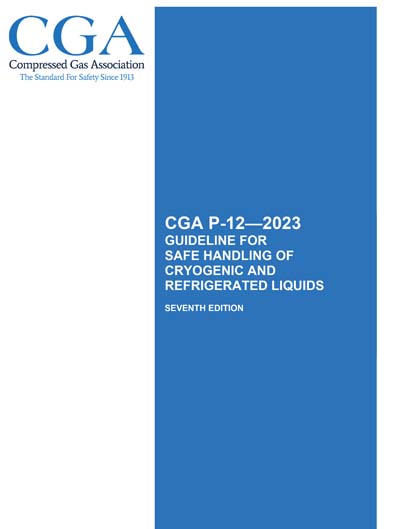Most recent
CGA P-12-2023
Guideline for Safe Handling of Cryogenic and Refrigerated Liquids - seventh edition
This publication provides general information about the properties, transportation, storage, safe handling, and safe use of the cryogenic and refrigerated liquids commonly used by industry and institutions. It is intended for cryogenic and refrigerated liquid users, shippers, carriers, distributors, equipment designers or installers, safety administrators, and anyone seeking an introduction to cryogenic and refrigerated liquids. If more detailed or specialized information is required, consult your cryogenic and refrigerated liquid supplier. The information in this publication is intended to complement federal, state, provincial/territorial, local, and insurance company safety requirements. Among common industrial gases that are transported, handled, and stored as cryogenic liquids, the most prevalent cryogenic liquids are oxygen, nitrogen, argon, hydrogen, and helium. Three rare atmospheric gases, neon, krypton, and xenon, are also transported, handled, and stored as cryogenic liquids. Typical refrigerated liquids include carbon dioxide and nitrous oxide. Although not usually classified as industrial gases, LNG, liquid methane, ethylene, and carbon monoxide are also transported, handled, and stored as cryogenic liquids. Some gases, including fluorine (boiling point -306.8 °F [-188.2 °C]) and nitric oxide (boiling point -241.2 °F [-151.8 °C]), can exist as cryogenic liquids due to their low boiling points. Both fluorine and nitric oxide are extremely reactive and hazardous to handle without extraordinary precautions; they are not normally handled as cryogenic liquids due to their reactive nature; it is more common for them to be handled as gases at ambient temperatures in the compressed gases industry. They are not discussed in this publication due to their specialized nature and hazards.
Compressed Gas Association, Inc. [cga]

